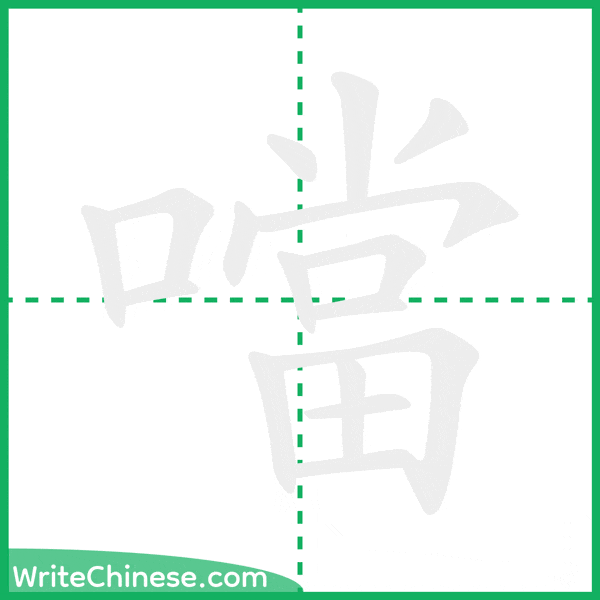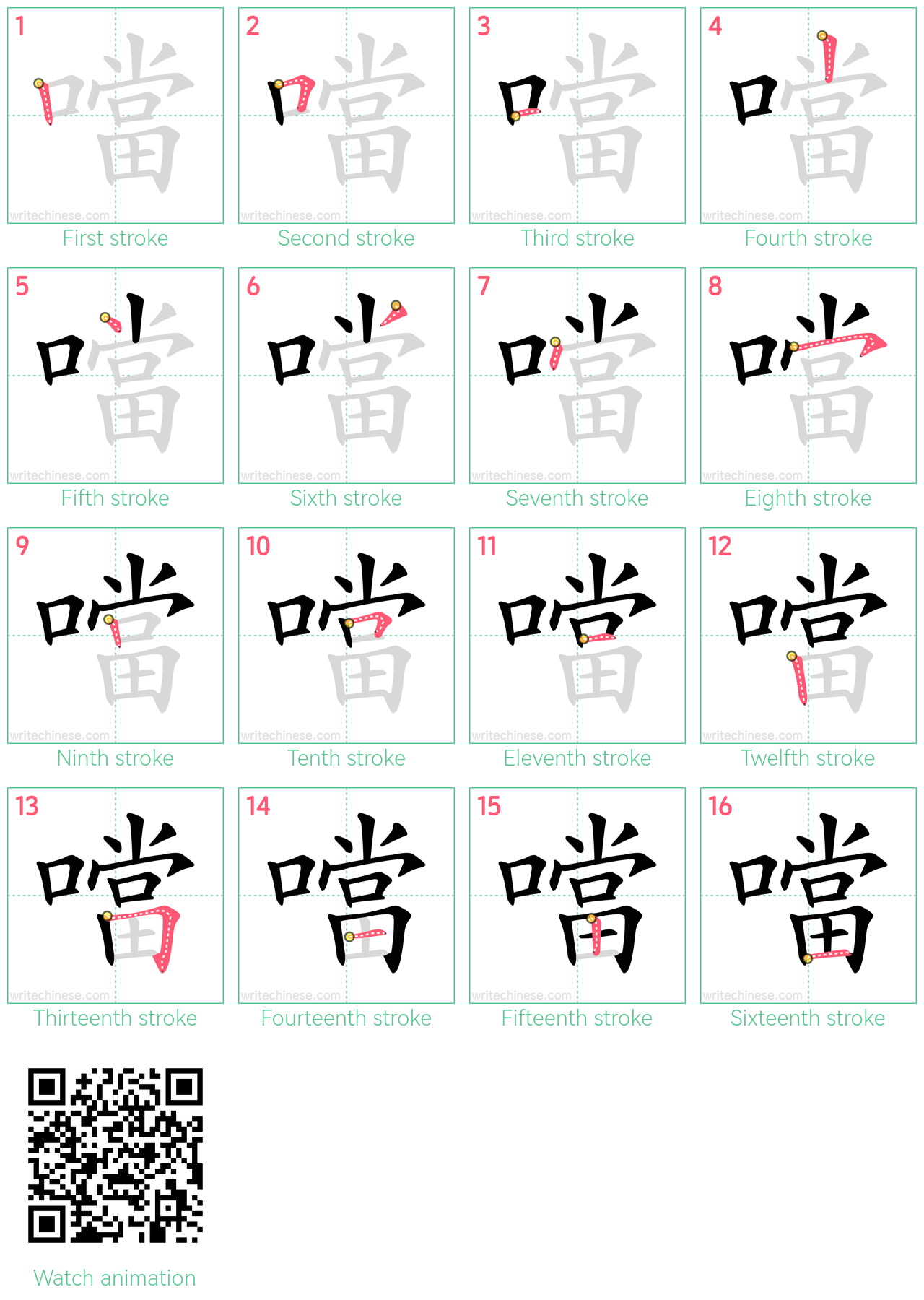How to write 噹
Animated Stroke Order of 噹
Learn to write the Chinese character "噹" by watching the stroke order animation of "噹".

Stroke by Stroke: 噹 Writing Order
Master the Chinese character '噹' stroke by stroke with visual step-by-step instructions.

Follow the Calligraphy Master: Writing '噹' Step-by-Step
Learn the proper way to write the Chinese character '噹' through a video tutorial with a calligraphy teacher. Follow the Calligraphy Master's Step-by-Step Guide to Write the Chinese Character '噹'. You can download the printable handwriting worksheets below and practice writing together with pen and paper.
Free Printable 噹 Handwriting Practice Worksheets
Meaning of 噹
Same Pronunciation Characters
Same Radical Characters
- 口
- 古
- 句
- 另
- 叨
- 叩
- 只
- 叫
- 召
- 叭
- 叮
- 可
- 台
- 史
- 右
- 叶
- 号
- 司
- 叹
- 叼
- 叽
- 吁
- 吃
- 各
- 吆
- 合
- 吉
- 吊
- 同
- 名
- 后
- 吏
- 吐
- 向
- 吓
- 吕
- 吗
- 君
- 吝
- 吞
- 吟
- 吠
- 否
- 吧
- 吨
- 吩
- 含
- 听
- 吭
- 吮
- 启
- 吱
- 吴
- 吵
- 吸
- 吹
- 吻
- 吼
- 吾
- 呀
- 呈
- 告
- 呐
- 呕
- 员
- 呛
- 呜
- 周
- 味
- 呵
- 呻
- 呼
- 命
- 咄
- 咋
- 和
- 咏
- 咐
- 咒
- 咕
- 咖
- 咙
- 咧
- 咨
- 咪
- 咬
- 咱
- 咳
- 咸
- 咽
- 哀
- 品
- 哄
- 哆
- 哇
- 哈
- 哉
- 响
- 哎
- 哑
- 哗
- 哟
- 哥
- 哦
- 哨
- 哩
- 哪
- 哭
- 哮
- 哲
- 哺
- 哼
- 唁
- 唆
- 唇
- 唉
- 唐
- 唠
- 唧
- 唬
- 售
- 唯
- 唱
- 唾
- 啃
- 啄
- 商
- 啊
- 啡
- 啤
- 啥
- 啪
- 啰
- 啸
- 啼
- 喂
- 善
- 喉
- 喊
- 喘
- 喜
- 喝
- 喧
- 喳
- 喷
- 喻
- 嗅
- 嗓
- 嗜
- 嗡
- 嗦
- 嗽
- 嘉
- 嘛
- 嘱
- 嘲
- 嘴
- 嘹
- 嘻
- 嘿
- 噩
- 噪
- 嚎
- 嚣
- 嚷
- 嚼
- 囊
- 叱
- 叵
- 叻
- 吡
- 吣
- 吲
- 呃
- 呋
- 呒
- 呓
- 呔
- 呖
- 呗
- 呣
- 呤
- 呦
- 呱
- 呲
- 呶
- 呷
- 呸
- 咀
- 咂
- 咆
- 咎
- 咔
- 咚
- 咛
- 咝
- 咣
- 咤
- 咦
- 咩
- 咫
- 咯
- 咴
- 咻
- 咿
- 哂
- 哌
- 哏
- 哐
- 哓
- 哔
- 哕
- 哙
- 哚
- 哝
- 哞
- 哧
- 哽
- 唏
- 唑
- 唔
- 唛
- 唢
- 唣
- 唰
- 唳
- 唵
- 唷
- 唼
- 唿
- 啁
- 啉
- 啐
- 啕
- 啖
- 啜
- 啧
- 啬
- 啭
- 啮
- 啵
- 啶
- 啷
- 啻
- 啾
- 喀
- 喁
- 喃
- 喈
- 喋
- 喏
- 喑
- 喔
- 喙
- 喟
- 喱
- 喵
- 喹
- 喽
- 喾
- 嗄
- 嗉
- 嗌
- 嗍
- 嗐
- 嗑
- 嗒
- 嗔
- 嗖
- 嗝
- 嗟
- 嗣
- 嗤
- 嗥
- 嗨
- 嗪
- 嗫
- 嗬
- 嗯
- 嗲
- 嗳
- 嗵
- 嗷
- 嗾
- 嘈
- 嘌
- 嘎
- 嘘
- 嘚
- 嘞
- 嘟
- 嘣
- 嘤
- 嘧
- 嘬
- 嘭
- 噌
- 噍
- 噎
- 噔


